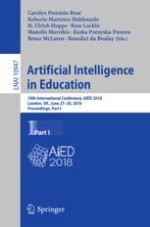
2018 | OriginalPaper | Buchkapitel
Investigating the Impact of a Meaningful Gamification-Based Intervention on Novice Programmers’ Achievement
verfasst von : Jenilyn L. Agapito, Ma. Mercedes T. Rodrigo
Erschienen in: Artificial Intelligence in Education
Aktivieren Sie unsere intelligente Suche, um passende Fachinhalte oder Patente zu finden.
Wählen Sie Textabschnitte aus um mit Künstlicher Intelligenz passenden Patente zu finden. powered by
Markieren Sie Textabschnitte, um KI-gestützt weitere passende Inhalte zu finden. powered by